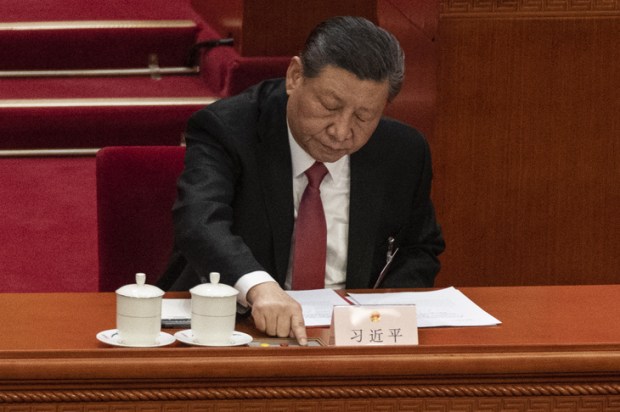At the conclusion of one of his ‘Forgotten People’ broadcasts in 1942, Robert Menzies said: ‘It is perhaps not untrue to say that if, in the history of the last hundred years, everybody had been compelled to subscribe to what the majority thought, there would have been no progress in the world and we should have become merely a community of dumb and driven cattle.’ I thought of this when reflecting on the latest attempts to control and diminish free speech in this country, namely the government’s proposed legislation to outlaw so-called ‘misinformation and disinformation’.It is a mark of the totalitarianism tendencies which inflict the West that such a bill is even being considered. How far have we travelled from, ‘I disapprove of what you say, but I will defend to the death your right to say it’?
Apart from the assault on free speech, the bill furthers a dangerous transfer of determining disputes to often unaccountable administrative agencies. This is a widespread practice much favoured by modern governments. Instead of prosecuting alleged offenders for a breach of the law for some alleged discrimination or bringing a civil action against them for defamation, for example, citizens find themselves entangled by a myriad of administrative tribunals – often with grand titles – some of which can ignore the usual precepts of natural law and justice. As many commentators have observed, the process itself becomes the punishment.
The Combatting Misinformation and Disinformation Bill is a confused mish-mash of generalisations that is imprecise about what constitutes misinformation. The bill draws a distinction between ‘misinformation’ which ‘contains information that is false misleading or deceptive’… and ‘is reasonably likely to cause or contribute to serious harm’ – and ‘disinformation’ which is defined as intended to deceive. In summary, harm is defined broadly to include hatred towards a group, based on various attributes; disruption of public order or society in Australia; harm to the integrity of democratic processes or government institutions; harm to the health of Australians; harm to the environment; and economic harm to the Australian economy. The breadth of this definition is astonishing. It will allow the weaponising of almost any political criticism. Imagine the assertions: opponents of fossil fuels will claim that support for them harms the environment; advocates of female-only sports will be accused of promoting hatred against transgender people; proponents of the Voice could claim that opposition harms democracy; the racing industry could assert that those who want it banned are harming the economy and so on. ‘Serious harm’ is undefined. It is not a matter whether any of these claims are accepted. They are political matters about which there should be free speech, not the stifling of discussion and debate by the imposition of arbitrary restrictions on publication.
The means of establishing misinformation, such as the resort to so-called ‘fact checkers’, are defective. I can relate my own experience. A decade ago, I authored a very detailed account of modern marriage and family issues. It was critically acclaimed by some of the best scholars in the sector. But a ‘fact checker’ claimed that a conclusion was inaccurate by finding a related study and a so-called expert as a basis of refuting it. The ‘fact check’ could have concluded that there was an alternative interpretation, but no, I must have been inaccurate – largely, I suspect, because the conclusion I had drawn, based on the research of many dispassionate social scientists, was contrary to the prevailing zeitgeist. Much of what passes for ‘fact checking’ is selective use of data or just opinion. Yet this is one of the bases that the Communications Authority (Acma) relies upon. This is compounded by the fact that social media providers have admitted to censoring information and views without any real foundation.
Secondly, the source of accepted information is biased. Recently, the former editor of the Lancet has been endeavouring to bat away claims that the journal supported the Chinese government’s narrative over its handling of the virus. As Covid started to spread, the journal published a letter from 27 experts which praised Beijing’s ‘rapid, open and transparent sharing of data on this outbreak’. The authors also attacked the ‘conspiracy theories suggesting that Covid does not have a natural origin’, in a move that helped silence the lab-leak debate. This bill would have allowed claims about the lab escape to be censored.
Moreover, some sources of information are exempt, but others not. So the Lancet – which the former editor now concedes based its articles on inaccurate and incomplete information – is an accepted source, but an independent group of scientists who questioned its assertions are not. Various medical authorities are exempt, but not the doctors whose concerns about the side-effects of the Covid vaccinations are now being accepted. Presumably misinformation provided by a CCP-influenced Confucius Institute is exempt, but not that from an independent think tank or scholar. Nor is it clear that the WeChat service, popular with many Australians of Chinese background is covered, despite the fact that it is used as a propaganda tool by the CCP.
The bill provides that Acma requires digital providers to establish codes and make rules about misinformation and disinformation. This adds even more unchecked discretion to the providers to ban content they determine contrary to the law, believe unwelcome by the government of the day, or contrary to the prevailing zeitgeist. There are no provisions about the openness and fairness of the process, nor the availability of a transparent appeal process. These provisions would have a chilling impact on free speech.
If real, the harms which this bill seeks to penalise could all be addressed by specific precise legislation. The bill’s accompanying guidance note provides examples of what might be considered a serious harm by Acma. The first is the incitement to commit hate crimes. This is a role for the criminal law. The second is the vandalising of critical communications infrastructure – a matter already subject to the criminal law. The third is ‘misinformation undermining the impartiality of an Australian electoral management body’. Again, a matter for electoral or criminal laws. The fourth example is ‘misinformation that caused people to ingest or inject bleach products to treat a viral infection’, presumably a direct reference to claims that hydroxychloroquine, referred to by critics as ‘bleach’, was effective in combatting Covid. Again, specific provisions under health laws are a more appropriate place for such provisions, if required. The fifth example is ‘misinformation about water savings measure during a prolonged drought’ – whatever that means! And finally, ‘misinformation by a foreign actor targeting local producers in favour of imported goods’. Once again, specific laws should be developed if this is really a serious issue.
A law that is vague and uncertain in its application or open to subjective interpretation is a bad law. Equally, a law that precludes an appeal on the facts or its interpretation is inadequate. And a law that empowers agencies and private entities to restrict freedoms without any real avenues to challenge its application is undesirable. Nor should a law restrict the fundamental freedom of speech unless there are clearly articulated and compelling reasons to do so, such as a real threat to the security of the nation. These principles should be central to any consideration of the proposed new laws about the restriction of so-called ‘misinformation’ and ‘disinformation’ in the digital media. The bill, if enacted, would further curtail political discussion and restrict free speech. It would be a bad law and we would be, in Menzies’ words, ‘dumb and driven cattle’.
Got something to add? Join the discussion and comment below.
Get 10 issues for just $10
Subscribe to The Spectator Australia today for the next 10 magazine issues, plus full online access, for just $10.
You might disagree with half of it, but you’ll enjoy reading all of it. Try your first month for free, then just $2 a week for the remainder of your first year.














Comments
Don't miss out
Join the conversation with other Spectator Australia readers. Subscribe to leave a comment.
SUBSCRIBEAlready a subscriber? Log in